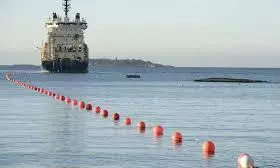
Nordic and German authorities suspect Russian sabotage in Baltic Sea cable disruptions
text_fieldsTwo major telecommunications cables in the Baltic Sea have been severed within 48 hours, raising concerns among Nordic and German officials about potential Russian sabotage as part of hybrid warfare tactics.
On Monday, Finnish operator Cinia reported damage to the "C-Lion1" submarine cable linking Helsinki and Rostock, Germany. The break was located south of Sweden's Oland Island, about 700 kilometers from Helsinki. Cinia emphasized that such damage rarely occurs without external interference.
Meanwhile, the "Arelion" cable between Sweden's Gotland Island and Lithuania was also found to be damaged on Sunday, according to Telia, the operator’s Lithuanian branch. While internet traffic has been rerouted and customers remain unaffected, Telia confirmed that the cable suffered material damage rather than equipment failure.
Finnish and German foreign ministers, Elina Valtonen and Annalena Baerbock, issued a joint statement hinting at possible sabotage. “This incident underscores the volatile nature of our times, where European security is threatened not only by Russia’s aggression in Ukraine but also by hybrid warfare,” they stated.
Sweden’s Minister for Civil Defence, Carl-Oskar Bohlin, stressed the importance of determining the cause of the disruptions, while German Defence Minister Boris Pistorius suggested sabotage is the likely explanation. "Nobody believes these cables were accidentally severed," he remarked.
These incidents follow a series of disruptions in the Baltic Sea region linked to growing geopolitical tensions - Nord Stream Blasts (underwater explosions damaged pipelines carrying Russian gas to Europe in September 2022) and the Finnish-Estonian Pipeline Incident (an undersea gas pipeline was damaged by an anchor from a Chinese cargo ship in October 2023).
Since Russia’s invasion of Ukraine in February 2022, Baltic Sea nations have heightened surveillance and security. Finland, which shares a border with Russia, has ramped up monitoring efforts, while NATO inaugurated a new naval base in Rostock, Germany, to coordinate Baltic Sea defense.
Moscow criticized NATO's new naval command center, calling it a breach of Germany’s reunification treaty, a claim denied by Berlin. Russian officials summoned the German ambassador to protest the establishment of the base.























